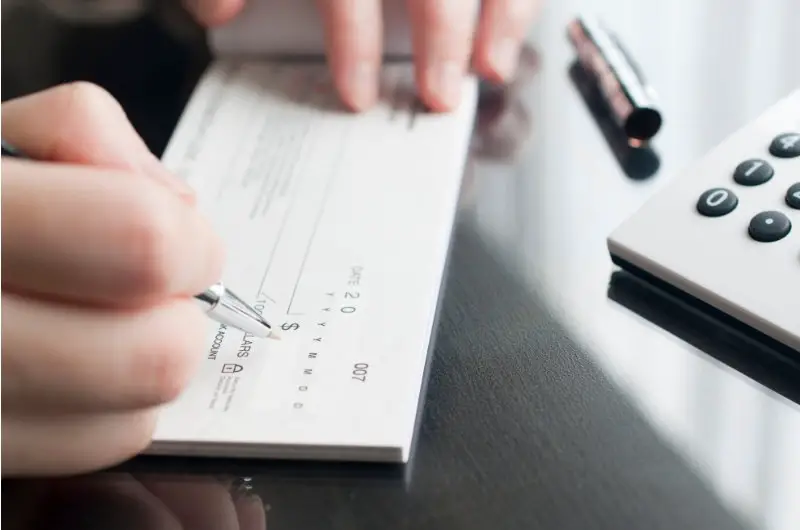Unlike a bank check, a personal check allows an employer to pay an employee directly from his bank account. As a recipient of a personal check, you might have several questions regarding the authenticity and legality of such payment.
Is It Common For Employers To Pay Employees Via Personal Checks?
Even though data sources reveal an overall decline in the usage of paper checks, they’re still a popular mode of paying employees.
Personal checks are considered a little problematic compared to checks from business bank accounts or government-owned bank accounts.
Personal checks are unpopular for the following reasons:
- If the personal account of your employer doesn’t have sufficient funds, the check is likely to bounce and the payment will not go through.
- Personal checks can be difficult to cash. Sometimes you might receive the amount divided into multiple payments over several days. This is again a security measure taken by the bank to ensure payments don’t bounce.
In what sort of businesses are employees most likely to be paid through a personal check?
Personal checks are generally unpopular among employees. This is because they’re likely to raise the doubt in the employee’s mind that their employer is involved in tax evasion or other fraudulent practices.
At the same time, employees do not have the right to dictate the mode of salary payment.
Small businesses and sole proprietors are likely to use the old-school method of paying their employees via personal checks.
Personal checks tend to be light on the pocket of the employer. Hence people with limited funds may find them a suitable method to pay their employees.
Is It Illegal To Accept Personal Checks?

No laws in the U.S specify what account your salary comes from; hence, getting paid via a personal check is considered legal.
However, the law in many US states and the UK requires employers to provide a payslip/stub. Therefore, not giving the employee this payslip would be illegal.
A payslip should have the following details on it:
- Employee information (Including name and social security number)
- Employer information
- Rate of pay of the employee
- Hours worked
- Date salary is paid to the employee
- Net pay
- Gross pay
- Deductions
- Taxes withheld (Such as the federal income tax)
How To Convince Your Employer To Pay You Properly?
If you do not want to be paid a salary through personal checks, then you need to convince your employer why personal checks are bad for them.
Before you decide to confront your employer regarding the issue of payment, you need to prepare yourself. Research thoroughly why personal checks are bad for the employer. If possible, pen them down on a piece of paper.
Some of the items that you may include within this list should be as follows:
- Personal checks are often insecure. They contain a lot of information regarding the employer including their name, address, and their signature. A check passes the hands of many people before it reaches the employee. Every person who touches the check is a weak link that can ultimately result in fraud. In 2017 143 million had their personal information compromised in the Equifax hack.
- Personal checks are easy to lose. It will mean additional work for the employer if the check gets lost before it reaches the employee.
- It may be a time-consuming process for employees to cash personal checks. This may result in employee dissatisfaction which in turn may impact the quality of work they do for the employer.
Alternatives To Personal Checks

You should be knowledgeable about some other modes of payment that are available to your employer. This will also come in handy if you manage to convince your employer that personal checks are unsuitable for paying their employees.
Some modes of payment that are available to employers and are generally considered more secure than personal checks are:
1. Direct deposits
Data reveals that approximately 93% of Americans are paid via a direct deposit. In addition to being a safer alternative to personal checks, direct deposits save your employer money. On average, it takes $3 for a business to print and distribute checks.
2. Certified checks, money orders & business checks
A certified check is one where the check has already been presented to the bank. The bank has approved the check after confirming that funds in the employer’s account are sufficient to cover the check.
Money orders are a guaranteed form of payment. They have been paid upfront and even allow the employee to obtain a refund if the money order is lost or not cashed within a certain time limit.
Business checks are much more secure than personal checks. Generally, there is a difference in the level of wealth of individuals and corporations.
A business check is unlikely to bounce, and the payment will be made to the employee in one go instead of in a series of installments.
3. Pay cards
Pay cards or payroll cards enhance the efficiency of the business by eliminating paper checks. Pay cards transfer funds electronically to each employee, whether or not they have a banking relationship.
Pay cards are also likely to save employees time as they spend less time cashing checks. This is likely to be ultimately better for business productivity.
How Do Personal Checks Affect The Payment Of Taxes?
1. If you are an employee
Personal checks, business checks, money orders, cash, and all other forms of employee pay are taxable. In the US, it doesn’t matter what your mode of income is. All income is subject to taxation.
The employer has to withhold tax money from the salary of their employees and pay it to the relevant authorities. These taxes may have been mandated at the federal or state level.
As an employee, if you are paid salary through a personal check, you need to ensure that employer is paying the taxes. This can be done by going through your payslip each time you get paid.
There should be mandatory tax deductions stated clearly within the payslip. If not, you should be worried about the integrity of your employer.
2. If you are a self-employed/independent contractor
Self-employed people are also often paid through personal checks. In such a case, they might believe it’s okay not to report this as income and, hence, not to pay taxes on this amount. However, this is illegal and is known as tax evasion.
Some states in the US also require the name and address of your clients if you’re self-employed. Again, if authorities consider this information to be incorrect, you could be subject to heavy fines.
In a nutshell, it doesn’t matter who you are and how you’re paid. If it’s income, then it’s taxable.
What To Do If Your Employer Pays You Through Personal Checks But Shows No Tax Deductions On The Pay Stub?
According to the IRS, employers who do not comply with the employment tax laws may be subject to criminal and civil sanctions.
Employees who are concerned that their employer is improperly withholding or failing to withhold federal income and employment taxes should report their employer by contacting the IRS at 800-829-1040
IRS
However, before reporting an employer to the IRS, an employee must always assess whether withholding taxes is the employer’s honest mistake.
If you believe that the full amount of tax hasn’t been withheld, talk to your employer about it first.
Your employer may consider you to be an independent contractor rather than an employee. In which case, they would be expecting you to pay taxes on your income.
If they do not resolve the issue or make feeble excuses about not paying taxes, you need to report to the authorities. Failure to do so is likely to land you and your employer in hot water with IRS.
The Personal Check They Gave You Has Bounced
It is always advisable to run a background check on a prospective employer before joining them.
Ticking off a couple of items on a checklist, such as an employer’s past track record in paying employees and the number of run-ins they had with the law, will give you a good idea of what sort of business relationship you will have with them.
Despite all due diligence checks, you still may find that the personal check they gave you as payment for a month of hard work has bounced.
In such a case, many states in the U.S give you the liberty to collect penalties from the employer for every day after you present the check to the bank that you are not paid by alternate means.
Conclusion
While a less than ideal way of getting paid, a personal check is by no means illegal. Even if you’re not comfortable getting paid by personal checks, you may have to accept them as a means of payment.
However, to secure yourself from fines and penalties imposed by IRS, you should always ensure that a pay stub is attached to the personal check you’re given.
If you’re an employee in the US, the employer should always give you a W-2 form to fill right at the beginning of the employment period. Subsequently, you are the one who should be keeping tabs on what is being withheld in taxes each month.
If you take appropriate measures to ensure that your employer is compliant with laws and regulations about personal checks, there is no serious reason for you to be concerned about being paid via personal checks.


